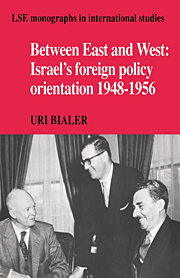Book contents
- Frontmatter
- Contents
- Acknowledgments
- INTRODUCTION
- Part I THE INTERNAL DIMENSION
- Part II RED STAR OVER ZION
- Part III THE WESTERN CONNECTION
- 9 THE MILITARY AND ECONOMIC DIMENSIONS
- 10 FROM NEUTRALITY TO THE SEARCH FOR A LINK
- 11 SOLIDIFICATION OF A WESTERN ORIENTATION
- 12 FAILURE OF “FACTS AND PACTS” POLICY
- EPILOGUE: “A people that dwells alone”?
- Appendix 1 U.N. voting record
- Appendix 2 Biographical notes
- Appendix 3 Israel's votes at the U.N.
- Index
- LSE MONOGRAPHS IN INTERNATIONAL STUDIES
12 - FAILURE OF “FACTS AND PACTS” POLICY
Published online by Cambridge University Press: 24 November 2009
- Frontmatter
- Contents
- Acknowledgments
- INTRODUCTION
- Part I THE INTERNAL DIMENSION
- Part II RED STAR OVER ZION
- Part III THE WESTERN CONNECTION
- 9 THE MILITARY AND ECONOMIC DIMENSIONS
- 10 FROM NEUTRALITY TO THE SEARCH FOR A LINK
- 11 SOLIDIFICATION OF A WESTERN ORIENTATION
- 12 FAILURE OF “FACTS AND PACTS” POLICY
- EPILOGUE: “A people that dwells alone”?
- Appendix 1 U.N. voting record
- Appendix 2 Biographical notes
- Appendix 3 Israel's votes at the U.N.
- Index
- LSE MONOGRAPHS IN INTERNATIONAL STUDIES
Summary
Egypt's refusal to participate in S.A.C.M.E. buried that particular idea. But it was soon replaced by another plan for the defense of the Middle East. In the summer of 1952, the Americans and British suggested the establishment of a Middle East Defense Organization (M.E.D.O.), which was to act as a planning headquarters in peacetime rather than (as the S.A.C.M.E. framework had envisioned) a direct and permanent command. Britain, the United States, France and Turkey were to provide the backbone of M.E.D.O., which was also to encompass military forces from Australia, New Zealand and South Africa. Arab participation was regarded as desirable, but not as immediately essential; Israel's situation was left deliberately vague.
Ultimately, the Arab states refused to participate in M.E.D.O., and by the latter half of 1952 the entire idea had been shelved. Until that outcome became clear, however, Israel was again faced with the need for decision and strategic choice. On the surface, and especially when contrasted with S.A.C.M.E., M.E.D.O. seemed to possess several advantages. It vaguely proposed some planning with Israel, not foreign bases in Israel; it did not offer any single state the sort of special status which S.A.C.M.E. had specified for Egypt; by including New Zealand, South Africa and Australia it widened the arc of Israel's possible supporters. On the other hand, M.E.D.O. still retained several of the features which had previously generated Israeli opposition to S.A.C.M.E.
- Type
- Chapter
- Information
- Between East and WestIsrael's Foreign Policy Orientation 1948–1956, pp. 256 - 275Publisher: Cambridge University PressPrint publication year: 1990

